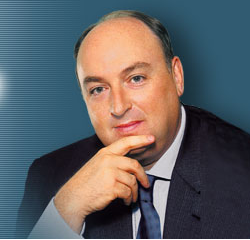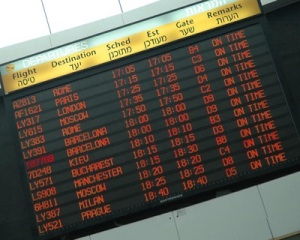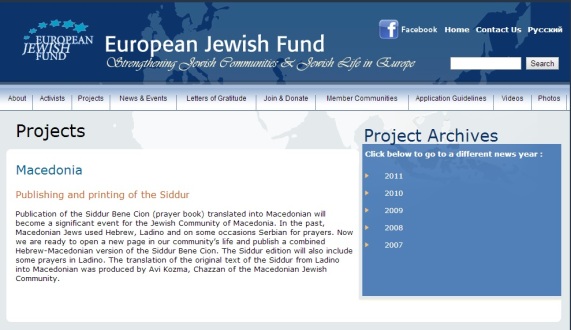Вячеслав Кантор
Владелец компании «Акрон»

Фамилия: Кантор
Имя: Вячеслав
Отчество: Владимирович
Должность: Владелец компании «Акрон»
Биография:
Родился в сентябре 1953 г. в Москве; в 1976 г. окончил Московский авиационный институт им. С. Орджоникидзе по специальности инженер-системотехник;
после окончания института занимался научной работой в МАИ им. С. Орджоникидзе, научно-производственном объединении “Спектр”;
1989—1993 — генеральный директор российско-американского предприятия “Интелмас” (интеллектуальные материалы и системы);
в 1993 г. возглавил Новгородское АО “Акрон”;
в 1994 г. в состав компании было включено АО “Дорогобуж” (Смоленская обл.);
10 декабря 1997 г. присвоено звание “Почетный гражданин Великого Новгорода”.
Источник: www.biografija.ru
2005-2009 президент Российского еврейского конгресса (РЕК);
с 2007 – президент Европейского еврейского конгресса (ЕЕК);
Женат, трое детей.
Источник: www.dirbiz.ru
Досье:
С начала 1980-х Кантор возглавлял специальную лабораторию при Московском авиационном институте по проектированию межорбитальных космических летательных аппаратов. В 1986 году разразился громкий скандал, связанный с продажей секретных сведений учреждения за рубеж, в связи с которым Кантора уволили после обнаружения его причастности.
Вскоре после чего Кантор создал коммерческий центр «Композит».
Источник: “Стрингер” от 09.12.2003
Затем Кантор занимает кресло руководителя советско-американского СП «Интелмас», занимающегося экологическим мониторингом. В 1992 году это предприятие каким-то образом получает у Юрия Лужкова в собственность исторический объект – усадьбу Киреевских-Карповых на Ордынке.
Источник: ИА “АКС-Ньюс” от 04.05.2007
Тогда же Кантор через будущего госсекретаря РФ Геннадия Бурбулиса, с которым у него завязалась дружба, знакомится с новгородским губернатором Михаилом Прусаком. С его помощью фирма Кантора занимается оценкой завода «Азот». Прусак был заинтересован в «удачной» приватизации предприятия. В 1993 году Кантор покупает фирму и переименовывает ее в «Акрон». Удается ему это весьма простым способом: сначала Кантор получил от фирмы партию минеральных удобрений на реализацию, а на вырученные деньги купил контрольный пакет акций самого предприятия.
Вскоре Кантор таким же образом приобретает смоленское предприятие ОАО «Дорогобуж», также по низкой цене.
С приходом Кантора экспорт минудобрений «Акрона» стал осуществляться через ряд оффшорных фирм в Панаме и Гибралтаре. Это позволило ему выводить часть выручки на личные счета.
Источник: “Стрингер” от 09.12.2003
Долгое время считалось, что эти компании подконтрольны самому Кантору. Однако на деле Гибралтарскими офшорами ММВ Center Ltd, SK Enterprises Limited владел и управлял ирландский мультимиллионер Дермот Десмонд. По некоторым данным, в том числе и на деньги Десмонда Кантор приобрел свой первый пакет акций «Акрона».
Источник: Компромат.ру от 05.03.2009
Вскоре Кантор стал предпринимать многочисленные попытки заполучить другие заводы отрасли. Так в поле его зрения попал мурманский «Апатит», который был куплен «Менатепом».
В разные периоды Кантор также пытался получить контроль над Кирово-Чепецким химкомбинатом, АО «Сильвинит», АО «Беларуськалий» и другими. С помощью протекции председателя Совета Федерации Егора Строева, того же Прусака, губернатора Смоленской области Прохорова и других он предложил государству передать «Акрону» в собственность крупные пакеты акций предприятий по производству минудобрений, причем не за деньги, а в обмен на акции «Акрона».
К тому времени в уставе «Акрона» было сказано, что в его совет директоров могли быть выбраны только менеджеры холдинга. Так что в случае обмена акций государство все равно не смогло бы влиять на «Акрон».
Как раз когда Кантор заполучил «Акрон» и «Дорогобуж», норвежский концерн NORSK HYDRO, крупная транснациональная корпорация, также стал предпринимать попытки экспансии в российскую сферу минудобрений. Концерн приобрел пакет акций ОАО «Апатит» – крупнейшего европейского производителя апатитового концентрата и некоторых других.
С 1995 года «Акрон» стал согласовывать с норвежским концерном действия по бизнесу. Обе компании были ориентированы на расширение влияния в минудобренческой сфере. Кантору нужны были возможности NORSK HYDRO в привлечении финансовых ресурсов, а также его акции «Апатита». Взамен он обещал акции «Акрона» и согласовывать экспорт.
В 1997 предприятия совместно учредили в Москве ЗАО «Нордик Рус Холдинг». Сделку Кантор умудрился оформить так, что у «Акрона» оказался контрольный пакет акций. Норвежцы сообразили, что их обвели вокруг пальца, уже позднее.
Когда после кризиса 1998 Кантору понадобилось создать для «Акрона» хорошую кредитную историю, между компанией и одним из ее акционеров – «Апатит Фертилайзерс», возник конфликт. Дивиденды показались компании недостаточными. Кантору нужно было замять этот момент. Зная, что «Апатит Фертилайзерс» имеет партнерские отношения с мурманским «Апатитом», он решает раздуть вокруг последнего скандал, чтобы шантажом заставить партнеров комбината уступить.
Так возникла идея Кантора создать совместную с государством компанию «Минеральные ресурсы». Это был грандиозный мошеннический проект. Кантор предполагал, чтобы государство внесло принадлежащие ему пакеты акций в минудобренческих предприятиях в «Минеральные ресурсы», а Кантор – акции «Акрона». Если бы все получилось, «Акрон» получил бы влияние над «Апатитом».
Кантор, задействовав административный ресурс в лице замминистра Мингосимущества РФ Пыльнева, а позднее и нового заместитель министра – Шалвы Бреуса, инициирует на «Апатите» проверки.
В 2001 Кантор несколько переиграл предложение государству. Он учел, что ему, возможно, скоро придется возвращать пакет акций «Апатита», находящийся в его управлении, норвежскому холдингу. Тогда Кантор предложил государству внести в совместное предприятие свой пакет ЗАО «Нордик Рус Холдинг», а государство по плану Кантора внесло бы свои 20% акций «Апатита». Так по плану Кантора государство помогло бы ему получить влияние над норвежской долей в «Апатите».
Этот госпакет акций «Апатита» заодно стал отправной точкой в деле «Менатеп-ЮКОС». В мошенничестве при его приобретении обвинили сначала Платона Лебедева, а затем Михаила Ходорковского. Кантор стал главным советником Генпрокуратуры в травле ЮКОСа. Акционер «Менатепа» Леонид Невзлин публично обвинял Кантора в доносительстве.
Источник: “Стрингер” от 09.12.2003
Сдав своих коллег по бизнесу, Кантор, по-видимому, испугался последствий и уехал жить в Израиль, предварительно получив гражданство, а также приобрел жилье в Швейцарии.
«Акрон» к этому времени более чем наполовину принадлежал трем оффшорам – SK Enterprises, ММВ Сenter Ltd и Wetech Ltd, за которыми стоит Кантор.
Источник: “Российские вести” от 25.02.2004
В 2000 «Акрон» приобрел «Московский конный завод №1», расположенного на Рублево-Успенском шоссе, получив государственную долю его акций почти бесплатно. Как это случилось, неизвестно. Заодно Кантор получил и часть земли завода, и захотел захватить ее целиком, чтобы потом продать.
Источник: “Стрингер” от 09.12.2003
Кантор стал массово скупать землю завода у бывших работников и пайщиков за бесценок. Многие соглашались, так как никогда в жизни не видели таких денег. Однако другие понимали адекватную стоимость своих земель, и уговорам не поддавались.
Источник: “Б-Ф.Ру” от 15.05.2003
На тех, кто не соглашался продать свою землю по низкой цене, Кантор оказывал давление, грозил увольнением. Пайщики объединились в инициативную группу.
Источник: “Б-Ф.Ру” от 02.04.2003
Но неожиданно оказалось, что часть земли МКЗ принадлежит правительству Московской области. А пока Кантор «жался», другие коммерческие структуры быстро сообразили, и раскупили паи по более высокой цене, оставив Кантора ни с чем.
Источник: “Парламентская газета” от 05.06.2008
В 2002 Кантор купил химкомбинат Red Sun в Китае, переименовав его в «Худжи-Акрон».
А в 2006 «Акрон» купил у Кантора его китайский завод. Кантор понял, что прибыли он не приносит, а так как больше никто бы его не купил, продал его своей же структуре, деньги же достались ему.
В том же году Кантор проделал другую любопытную операцию: купил старый аммиачный заводик в Италии, уже закрытый.
Источник: “Паритет-медиа” от 27.05.2008
Сначала Кантор купил этот завод с землей в свой оффшор, затем, дождавшись субсидий еврокомиссии для Италии, получил дотации на ликвидацию предприятия, и продал металлолом своему «Дорогобужу», по цене высокотехнологичного оборудования. Многотонное нерабочее оборудование было перевезено и сложено на промплощадке. Земля же, на которой стоял заводик, освободилась, и Кантор наверняка нашел ей применение.
Источник: The Moscow Post от 02.10.2008
У Кантора было много неудачных задумок. Так, ему не удалось заполучить Кирово-Чепецкий комбинат, стратегический для России. В Середине 90-х Кантор направил письмо Ельцину через Совет Федерации, в котором обосновывалась необходимость передачи комбината в структуру «Акрона». Ельцин указ не подписал, правда, Кантор все-таки получил контроль над комбинатом ненадолго неизвестным на нынешнее время образом. Только указ Черномырдина вернул контроль над стратегическим предприятием Минатому.
Источник: “Российские вести” от 25.02.2004
В 2005 Кантор оказался замешан в историю с попыткой продажи ракет Х-55 в Иран и Китай через Украину. В расследовании дела всплыли названия двух оффшоров «Isofert Trading INC» и «Transchem International INC», принадлежащих Кантору. Украинские СМИ писали, что эти компании были связаны с финансовыми операциями компании “Far West Ltd”, посредническую роль между ними играл Кантор.
Важными партнером Кантора был также Виктор Ющенко – Кантор был его советником с апреля 2005 по 2007 год.
Источник: ИА “АКС-Ньюс” от 04.05.2007
Кантор наряду с Березовским известен как спонсор «Оранжевой революции» на Украине в 2005, приведшей к отмене первоначальных результатов выборов президента.
Источник: “Паритет-медиа” от 27.05.2008
После истории с ракетами Кантор был обязан тем, что избежал наказания, Госдепу США. Долг ему пришлось отдать, когда у американского агента в Латвии Сола Букинголтса возникли проблемы. Сол задолжал крупную сумму Валерию Берлину – казначею «харитоновской» преступной группировки. Вскоре Берлин был убит, но его соратники выбили у американского агента признание в долге. Отдавать ему было нечем, и тогда на помощь пришел Кантор, устроивший его в Российский Еврейский Конгресс. В качестве оплаты долга Сол помогал латвийским авторитетам в легализации бизнеса в России. solomin, 07.10.2008, Фото: “Коммерсант”
В 2006 Кантор вызвался организовать международный форум Let My People Live в Киеве, посвященный памяти жертв фашистов в Бабьем Яре. В итоге, руки до мероприятий у него так и не дошли. Вернуть былое расположение Виктора Ющенко Кантору не удалось.
Источник: Компромат.ру от 05.03.2009
В 2007 структуры Кантора начали противоборствовать Газпромбанку в конфликте по поводу месторождения газа Береговое в ЯНАО. Это – основной актив «Сибнефтегаза», часть акций контролирует дочерняя структура «Газпрома», часть – «Акрон». «Сибнефтегаз» захотел продать все «Газпрому» и «Транзитнефтегазу», Кантор пытается заблокировать сделку через суд.
Источник: ИА “АКС-Ньюс” от 04.05.2007
В 2007 Кантор готовил «Акрон» к IPO, поэтому остерегался выводов активов. Но летом 2008 года стало понятно, что затея провалилась, но имущества, которое можно было бы продать своим же структурам, не было, а оффшорным трейдингом было заниматься рискованно. Но Кантор находит другой путь – выплачивает огромные дивиденды, в том числе и себе самому. А в это время стоят предприятия, которые могли бы уже во всю приносить пользу.
Например, еще в октябре 2006 дочернее предприятие «Акрона» «Северо-западная фосфорная компания» бесплатно получила лицензию на разработку апатитового месторождения «Олений ручей». Месторождение должно было вступить в строй в 2010, но Кантор не спешил начинать там работу.
А в марте 2008 «Акрон» получил лицензию на освоение Талицкого участка Верхнекамского месторождения. За лицензию Кантор расплатился кредитом.
Если бы не огромные дивиденды, Кантору хватило бы средств на развитие обоих месторождений.
Источник: The Moscow Post от 02.10.2008
В 2008 в Европейском еврейском конгрессе (ЕЕК), президентом которого является Кантор, разразился громкий скандал. Кантор выступил с резким осуждением четырех национальных организаций, объявивших о выходе из конгресса. Представители Франции, Германии, Австрии и Португалии были возмущены изменением в уставе ЕЕК, введенным Кантором, согласно которому срок президентских полномочий продляется с 2-х до 4-х лет.
Источник: “Век” от 26.02.2008
В 2009 Кантор развязал информационную войну с профсоюзом «Акрона», отстаивавшим интересы его работников. Поводом войны послужило требование повысить зарплату.
Противостояние Кантора с профсоюзом началось еще в 1994, когда он атаковал профсоюз и его лидера Сергея Яна. Кантор захотел сместить его, но рабочие вступились. Тогда Кантор обратился в прокуратуру и каким-то образом добился решения о том, что отказ профсоюза ущемляет его права человека.
Но Ян и рабочие не сдавались, Кантору не удалось провести своего кандидата в руководители. Противостояние продолжалось до 1997, когда Яна избрали депутатом. На время конфликт улегся. Но в 2006, когда Кантор впервые отказал в повышении зарплаты. Он сказал рабочим подождать, пока решится кризисная проблема с поставщиком сырья, «Апатитом». Но даже когда «Акрон» и «Апатит» договорились о ценах, Кантор зарплату не повысил.
Началась война. Кантор установил жучки в кабинете Яна. А затем в «Акрон» пришли сотрудники ФСБ и нашли их. По факту обнаружения возбудили уголовное дело.
А через время Ян попал в странную автомобильную аварию, в которой, по всей видимости, должен был стать «случайной» жертвой, но чудом уцелел. Договориться так ни о чем и не удалось, зарплаты повысили только отдельным работникам.
Источник: Компромат.ру от 05.03.2009
Также в 2008 ОАО «Акрон» зарегистрировало в США компанию Agronova International Iac., якобы для прорыва на американский рынок, скорее всего, тоже для вывода активов.
Источник: Компромат.ру от 05.03.2009
Отец Кантора Владимир работал директором Сокольнического универмага в Москве. Был осужден за хищение имущества, умер вскоре после суда.
Источник: “Стрингер” от 09.12.2003
Катя, дочь Кантора, судится с отцом, обвиняя его в издевательствах над собой. По версии Кантора, он много лет пытался вылечить ее от наркотической зависимости, и изолировал ее для лечения. Катя же сбежала от отца в Израиль, и говорит журналистам, что не страдала тяжелой зависимостью, а Кантора обвиняет в черствости.
Источник: “Маарив” от октября 2008









